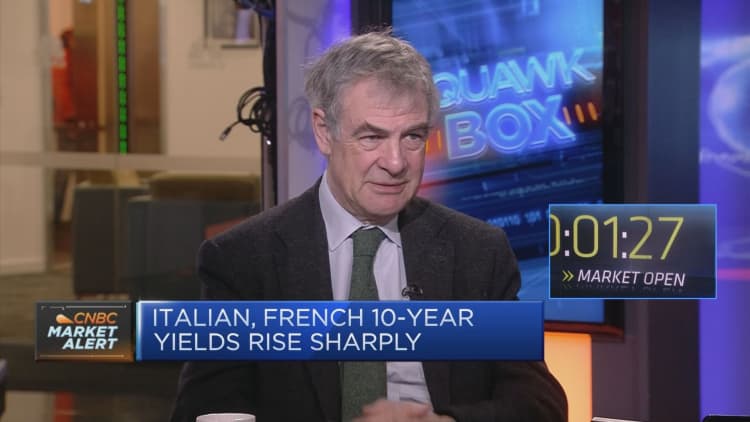The world will have to learn to live with COVID-19 as the virus will be "with us permanently," a former Bank of England official told CNBC on Monday.
Speaking to CNBC's "Squawk Box Europe," John Gieve, former deputy governor at the Bank of England, said policymakers had a "huge job" to stop businesses from just closing down.
"The difficulty here is that people are making their own decisions, so the government might be saying: 'go to your bank, build up your debts', but some businesses will be thinking: 'well if I face three months of that I'm never going to be able to pay this back, so I'd better close down now,'" he said.

Policymakers, he suggested, would be looking at how they can sustain companies and "put (them) in cotton wool" ready for the eventual recovery.
"That, economically, is the biggest problem, and of course it's very difficult because we don't know whether we're talking three months, six months," he added. "Clearly, COVID-19 is with us now permanently – that's something we've got to get used to over a period of years – but when the peak impact on the economy's going to be, I think that's still a bit unclear."
'Keep calm and carry on'
Strategists and market participants have been calling on policymakers to do more to protect businesses and the economy as the duration of the coronavirus crisis remains uncertain.
Peter Toogood, CIO of The Embark Group, told CNBC's "Squawk Box Europe" on Monday that the outbreak had created an "economic dislocation we haven't witnessed since the Second World War."
"Of course it's 'keep calm and carry on,' but you have a major, significant supply shock. That is going to involve very different responses – and this is the first wave, this is just to stop everyone liquidating everything and hiding in a bunker," he said. "We will go over the hump at some point, but that's not measured in weeks, it's measured in a year or two at least of dislocation."
He added that government responses would have to be "very different" from stimulus measures used by policymakers in the past.
"I'm thinking you're suspending tax payments, you're directly paying people individually — there's all sorts of direct action governments are going to have to take to make this smoothed over," Toogood told CNBC.
Toogood is not the first to have suggested that governments must think outside the box in order to protect their economies from the effects of the pandemic.
Speaking to CNBC last week, Jim O'Neill, chair of Chatham House, said the coronavirus crisis gave governments "a fantastic excuse" to be much more imaginative with their fiscal policies. While Andrew Freris, CEO of Ecognosis Advisory, told CNBC's "Capital Connection" on Friday that the U.S. should consider giving citizens $1,000 a month to mitigate the economic fallout.
Countries in the West have responded differently to the COVID-19 crisis. Many European countries have implemented restrictions aimed at reducing public gatherings, which has involved closing schools, museums, and restaurants. Others, including Germany, have taken further steps and restricted who can cross their borders.
However, the U.K.'s government has implemented some milder measures, but stopped short of closing schools or banning public gatherings. Elsewhere, the Trump administration has implemented bans on travel into the U.S., while individual cities in the country have taken steps like closing bars and restaurants to encourage social distancing.

